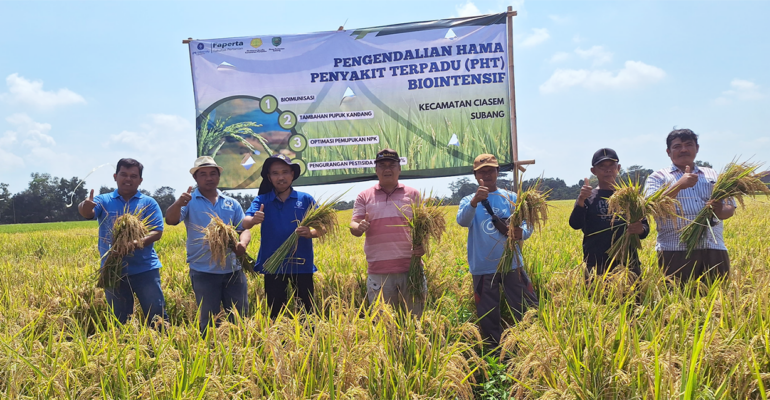IPB University Implements Biointensive Pest Control Technology, Avoids Threat of National Rice Production Shortage

In 2024, rice shortage will be a challenge for food security in Indonesia. IPB University, through the Faculty of Agriculture (Faperta), is implementing Biointensive integrated pest control (PHT) technology on rice plants in Subang in the 2024 planting season.
Biointensive PHT consists of seed bioimmunization, addition of manure, optimization of NPK fertilization, and reduction of synthetic chemical pesticides by 50 percent. In addition, monitoring of pests and diseases and collection of stem borer egg clusters in nurseries are carried out.
On Friday (27/9), a joint harvest was carried out by the Dean of the Faperta IPB University, Prof Suryo Wiyono, together with the Chief of the Post-Harvest Section of the Subang Agriculture Service, Sukma Permana, and the Chief of the Ciasem Regional Technical Implementation Unit (UPTD) of the Subang Agriculture Service, Mad Anwar, along with 30 farmers in Jatibaru Village, Ciasem District, Subang Regency.
This activity is a collaboration between the Faculty of Agriculture of IPB University, the Directorate of Cereals of the Ministry of Agriculture, and the Subang Agriculture Service. Thanks to the application of Biointensive IPM technology, the average productivity of farmers is 7,9 tons of dry grain harvested per hectare (GKP/ha) which has increased by 29 percent on 150 ha of land compared to the average of farmers in the surrounding area which is 6,2 tons of GKP/ha.
“This harvest proves that rice productivity in production centers can still be drastically increased by applying technology,” said Prof Suryo who is also a Professor of Plant Protection at IPB University.
Meanwhile, Sukma Permana added, “Hopefully IPB University technology can be disseminated to all farmers in Subang.”
Ajo, as the Chief of the Jatibaru Village Farmers Group, stated, “This rice vaccination technology shows real results, rice becomes more resistant to pests, thus reducing costs.” (*/Lp) (IAAS/ASD)



